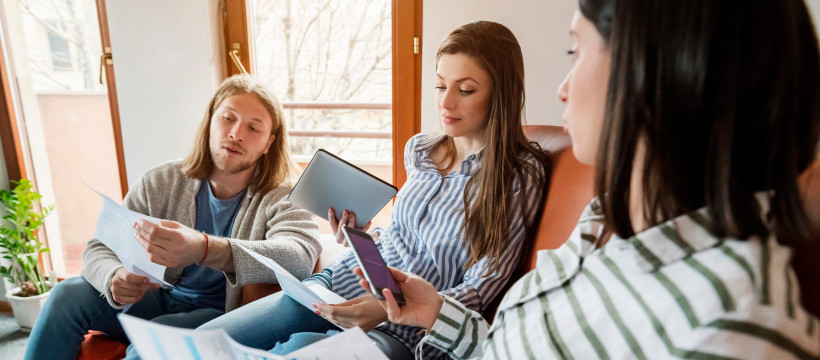Confused about energy bills? We can help.

Moving into your first place can be equal parts exciting and scary. There’s lots to think about and get your head around, especially when it comes to your energy bills. If you have any questions about meter readings, finding the best supplier, splitting bills with housemates and more - we’ve got you covered.
Energy bills 101
Ever received an energy bill and not sure what any of it means? You’re not alone. From tariffs, to usage, to your account balance - we break it all down for you in our blog.
Splitting with housemates
Disagreements with housemates are inevitable - from whose turn it is to take the bins out, to who used the last of the milk, or who’s hogging the bathroom… don’t let your energy bills be one of the things you fall out over. Check out our top tips for sharing bills with housemates.
New home, who dis?
Trip to IKEA? Check. Big food shop? Check. Sorting out your energy bills? That’s where we come in.
Our checklist breaks down what to do to organise your energy bills when moving into your new home, so you can focus on the important stuff like house plants and that first takeaway:
1. Get a copy of your home’s electrical and gas safety check reports
By law, your landlord has to make sure your home meets electrical and gas safety standards. The gas safety check has to be done every 12 months and the electrical safety check every 5 years. They have to give you a copy of the certificate.
2. Discuss with your flatmates how you will split and pay for the bills
If only your name is on the bill, then you’re legally responsible to pay the whole bill — so it’s a good idea to have everyone’s name on there, so you’re all equally responsible. If one person doesn’t pay their share, speak to your supplier as they may give you more time to pay.
There are some companies who will combine all your bills for you — this is called ‘all inclusive bills’ or ‘bill splitting’. These companies can be helpful but you’ll have to pay for the service so it will be more expensive. Before signing up to anything make sure you check reviews and compare the price between using a company and paying the bills yourself.
3. Set up an account with your energy supplier
If you don’t pay your landlord for energy, you’ll need to let the energy supplier know and set up an account with them. This will include confirming your payment information, as well as providing the names for the account.
4. Send a meter reading to your energy supplier
Make sure you take a meter reading the day you move in and send this to your energy supplier — and take a photo so it’s time stamped. Also, make sure to follow up with regular meter readings throughout your tenancy. This will ensure you are only paying for energy you use during the dates you live at the property and that you are being charged only for actual usage instead of an estimated figure.
5. Regularly check up on your usage
When you get your bill, make sure you check that you are being charged for your actual use and not estimated figures. If you send regular meter readings, or have a smart meter, your energy supplier should have up to date figures — but even if you have a smart meter, you should still check your bills are not estimated as your smart meter might not be sending your readings across.
Need more advice?
Call our consumer helpline for advice on energy on 0808 223 1133
To contact a Welsh-speaking adviser: 0808 223 1144
Our helplines are available 9am to 5pm, Monday to Friday. They’re not available on public holidays and calls are free from mobiles and landlines.
Our advisers can:
give you practical and impartial advice on how to resolve your consumer problem
tell you the law which applies to your situation
pass information about complaints on to Trading Standards (you can’t do this yourself)
pass a complaint to your energy supplier
Find out how else you can contact our consumer helpline for advice on energy here.
Last updated: September 2025